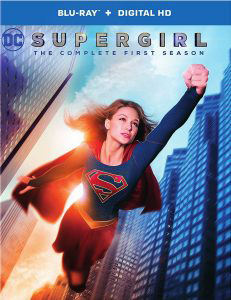CBS’ “Supergirl,” which recently wrapped up its first season, raises compelling questions about the societal role of someone blessed with extraordinary skills. Although Supergirl is held up as a paragon of virtue by the citizens of Capital City — and the world – an observer could make a case that she’s barely doing the minimum for someone who is made of steel and who can quickly fly anywhere in the world without her arms even getting tired.
Granted, she’s not a god
Now, don’t get me wrong, I think Supergirl’s only moral obligation is what I’d expect of a normal human: If she observes someone in need of help, she should not walk (or fly) away. I believe gods should be held to a higher – not lower – moral standard than mortals, but Supergirl is not a god. To her credit, she doesn’t claim to be; she wants to be accepted as human (and it helps that Kryptonians coincidentally look exactly like humans). So we can avoid wading into the morass of theism and divinity vis a vis Kara Zor-El.
There is no question that Supergirl has done a lot of good, and she should also get credit for not using her powers for evil. Other than her cousin, Superman, almost everyone else from Krypton uses their natural abilities (“superpowers” by Earth standards) for evil.

“Supergirl” Season 1 (2015-16)
CBS, 20 episodes
Creators: Ali Adler, Greg Berlanti, Andrew Kreisberg
Stars: Melissa Benoist, Chyler Leigh, David Harewood
But rather than examining Supergirl’s behavior as a moralist or psychologist might, let’s look at it in the context of how she is viewed by the masses. While it’s to humanity’s credit that they accept Supergirl, they go too far with their near-worship of her. I take serious issue with the fact that Supergirl is held up by the citizenry as a role model and a person of extraordinary moral fiber, not merely extraordinary skills. What does she do to earn this status? Almost nothing.
First, we should remember that she is an alien, so what we see as “super” traits are perfectly normal on her world, Krypton. While it would be amazing (indeed impossible) for any human to fly or lift tons of steel, these are normal traits for her; she was born with them. Praising her for these abilities would be like giving credit to a human for walking around the block or lifting a jug of milk.
She has conditioning to overcome
Second, Kara knew she had superpowers her whole life, but she doesn’t put them to use until she is in her 20s. For more than a decade, people whose lives she could’ve saved went unsaved. I believe Kara herself does not deserve any blame for her lack of superhero-ing during her years under the guardianship of her adoptive parents, Jeremiah and Eliza Danvers.
They forbade her from doing good deeds with her powers, and also scared her into believing – falsely, as it turned out – that she would be shunned or locked up by society if she revealed those powers. In a flashback scene set soon after the Danverses adopt her, Kara saves a woman and her child from a wrecked car. Rather than being praised, Kara is chastised by her parents; it’s understandable that this would permanently scar Kara’s views on the act of saving lives.

The Danverses’ fears about Kara’s powers being revealed are absurd. Kara’s cousin is Superman, who has already paved the way for her acceptance by society. While it’s true that we see the Martian shapeshifter J’onn J’onzz persecuted by the Department of Extra-Normal Operations (DEO) simply for being an alien, his case is different from that of Supergirl and Superman.
J’onzz is hurt by the fact that 1) He looks like an alien, and 2) He took over the appearance of a real human. While it is inexcusable that the DEO locks J’onzz up without proving a criminal motive, let alone any criminal act, it’s also clear that his case has suspicious aspects.
While I excuse Kara’s wallflower lifestyle during her years under her parents’ roof, it becomes less excusable once she becomes a legal adult. Superheroes have been known to find ways to help people without waiting for permission from their parents or the authorities (see, for example, Batman). Once she turns 18 and can legally make decisions for herself, Kara continues to hide her abilities – not an immoral act, but nonetheless a selfish one. With each day that goes by, the number of lives she could have saved piles up.
Her concern for others is questionable
Right from the start of the TV series, we see damning evidence against Supergirl not so much in her lack of action, but rather in her demeanor: She is clearly not bothered by her failure to save lives; she is only bothered by her failure to be her true self. The first life she saves in her “career” as Supergirl is that of her sister, Alex Danvers, whose plane is crashing right there in National City.
Yes, she saves everyone on the aircraft, but that’s incidental; it’s clear that she would’ve let the plane crash (and not lost any sleep over it) had she not known that Alex was aboard. Let that sink in for a moment: If not for her sister being on the plane, she would have let it crash, and let all those innocent people die.
When it turns out that society accepts Supergirl and her flying ability and super-strength, just as they did with Superman, she is so thrilled that she jumps off a building – nearly giving her friend Winn a heart attack, again demonstrating her selfish side – and gleefully flies around, reveling in her freedom. Soon afterward, she is accepted by the DEO and given a clearly defined structure for fighting the good fight.
This brings me to a third point against Supergirl’s status as a paragon of virtue: She only works at the DEO part-time; she spends most of her working life in the guise of glasses-wearing, coffee-fetching secretary Kara — or “Kiera,” as her boss, Cat Grant, calls her — at CatCo Worldwide Media. (Superman, in most incarnations of the saga, is likewise guilty of living an unnecessary double life.)
I think it’s safe to assume that the DEO would find Supergirl a full-time position and pay her a generous wage, but she selfishly wants to work for CatCo. Every minute she spends there she could instead be using to save lives. Because Kara works in the media, she is even more aware than the average person of all the bad news in National City and the world – all the areas in which she could make a difference.
She thrives on praise
As long as we’re on the topic of self-centered choices, let’s also consider that Kara seems to thrive upon the praise that goes with doing a good deed. This is a typical human trait, not the trait of someone who should be held up as an extraordinary being.
Her parents taught her not to save lives because she would risk her alien identity being exposed. Now that she has overcome that fear, she has gone to the opposite extreme: Only saving lives in high-profile situations. Not once on the show have we seen Supergirl save a life without getting a front-page “atta-girl” from the fawning media and adoring public.
Although people look up to her, Supergirl is not much of a leader. When she is in the tunneled-out headquarters of the DEO, she is a cog in the machine – albeit a crucial cog — rather than the free-thinking, positive moral influence we might expect her to be based on how society worships her. Indeed, rather than condemning it, Supergirl supports and participates in the indefinite detention of Maxwell Lord rather than charging him with a crime. (Lord programmed a braindead girl as a Bizarro-Supergirl, although no one was hurt in the incident.)
Eventually, James Olsen convinces her that imprisoning someone who hasn’t been charged with a crime goes against the values she claims to uphold, and she does the right thing and lets him go. (Her begrudging expression suggests she hasn’t grasped the lesson, though.)
Self-centered young adult
Looking back at “Supergirl” Season 1, it’s hard not to see Supergirl as a self-centered young adult. The season’s closing episodes starkly reaffirm that Supergirl’s maturation has stagnated now that she is famous. In the penultimate episode, the evil mind-control entity Myriad flings three of Kara’s co-workers off the CatCo skyscraper, giving her time to sweep in and catch two of them before they hit the pavement. She saves her two friends, Winn and James, while the third person falls to her death.
This act alone does not make her a bad person by any means (any of us would’ve saved our two friends in that situation). But it looks bad when coupled with other scenes. In the finale, Kara only remembers the death of the other woman when she sees flowers and other monuments to this tragic loss of life on the woman’s desk. It’s not that she forgot to send a card to the woman’s family; she flat-out forgot about her death.
Later in the episode, Kara is celebrating the victory over Myriad with her friends and family. It’s not an exaggeration to say she is more concerned about James returning her affections than she is about her dead co-worker or any living humans who might need help.
There is a counter-argument to be made: That Supergirl has achieved a successful balance in her life that will ultimately be good for all of humanity. Perhaps she consciously or subconsciously patterns her life choices after that of Superman, who operates the same way. What comes off as the selfishness of a teenager (even though Kara is 24) might be an ingrained pragmatism.
Yes, she whoops it up with her pals when she could be following the police scanner for reports of people in danger, or working with allied troops against ISIS in the Middle East. But if she did save lives 24/7, not only would she not get to experience any aspects of normal life, she might also get psychologically burned out.
Is she developing a work-life balance?
So one could make a case that Supergirl is pragmatically extending her superhero career by building plenty of R&R and me-time into her schedule to avoid psychological burnout, like how a baseball pitcher is on a pitch count in the regular season so he can perform better in the playoffs.
(The issue of the physical toll experienced by Supergirl is unclear. It seems she has endless energy so long as the sun is shining and there’s no Kryptonite around, but on the other hand, she does require sleep and food and workouts to stay in top form, just like a human.)
Perhaps by finding a balance in her life, her self-interest benefits humanity in the long run.
What are your thoughts on this issue? Are Supergirl’s virtues overrated? Or should she be commended for striking a healthy balance in her life?

